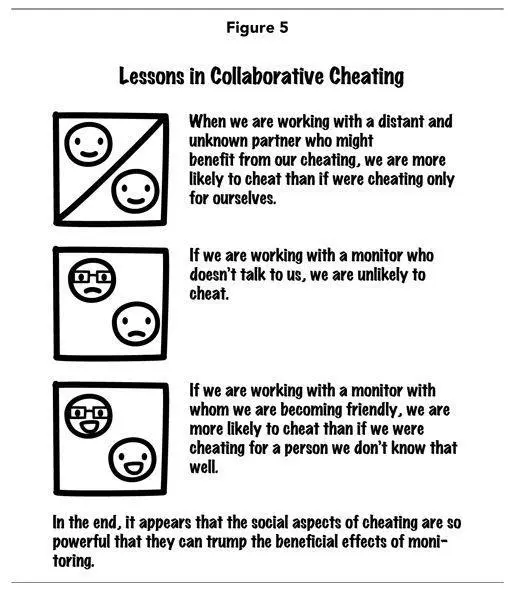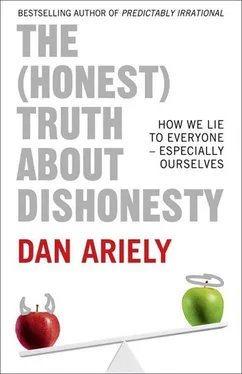Ariely, Dan - The (Honest) Truth About Dishonesty - How We Lie to Everyone – Especially Ourselves
Здесь есть возможность читать онлайн «Ariely, Dan - The (Honest) Truth About Dishonesty - How We Lie to Everyone – Especially Ourselves» весь текст электронной книги совершенно бесплатно (целиком полную версию без сокращений). В некоторых случаях можно слушать аудио, скачать через торрент в формате fb2 и присутствует краткое содержание. Жанр: Старинная литература, на английском языке. Описание произведения, (предисловие) а так же отзывы посетителей доступны на портале библиотеки ЛибКат.
- Название:The (Honest) Truth About Dishonesty: How We Lie to Everyone – Especially Ourselves
- Автор:
- Жанр:
- Год:неизвестен
- ISBN:нет данных
- Рейтинг книги:4 / 5. Голосов: 1
-
Избранное:Добавить в избранное
- Отзывы:
-
Ваша оценка:
- 80
- 1
- 2
- 3
- 4
- 5
The (Honest) Truth About Dishonesty: How We Lie to Everyone – Especially Ourselves: краткое содержание, описание и аннотация
Предлагаем к чтению аннотацию, описание, краткое содержание или предисловие (зависит от того, что написал сам автор книги «The (Honest) Truth About Dishonesty: How We Lie to Everyone – Especially Ourselves»). Если вы не нашли необходимую информацию о книге — напишите в комментариях, мы постараемся отыскать её.
The (Honest) Truth About Dishonesty: How We Lie to Everyone – Especially Ourselves — читать онлайн бесплатно полную книгу (весь текст) целиком
Ниже представлен текст книги, разбитый по страницам. Система сохранения места последней прочитанной страницы, позволяет с удобством читать онлайн бесплатно книгу «The (Honest) Truth About Dishonesty: How We Lie to Everyone – Especially Ourselves», без необходимости каждый раз заново искать на чём Вы остановились. Поставьте закладку, и сможете в любой момент перейти на страницу, на которой закончили чтение.
Интервал:
Закладка:
That’s the bad news, and it’s not all of it.
HAVING ESTABLISHED ONEnegative aspect of collaboration—that people are more dishonest when others, even strangers, can benefit from their cheating—we wanted to turn our experimental sights on a possible positive aspect of collaboration and see what would happen when team members watch each other. Imagine that you’re in a room with a few other participants, and you’re randomly paired up with someone you have never met before. As luck would have it, you’ve ended up with a friendly-looking young woman. Before you have a chance to talk to her, you have to complete the matrix task in complete silence. You are player 1, so you start first. You tear into the first matrix, then the second, and then the third. All the while, your partner watches your attempts, successes, and failures. When the five minutes are up, you silently put your pencil down and your partner picks hers up. She starts working on her matrix task while you observe her progress. When the time is up, you walk to the shredder together and shred your worksheets. Then you each write down your own score on the same slip of paper, combine the two numbers for your joint performance score, and walk over to the experimenter’s desk to collect your payment—all without saying a word to each other.
What level of cheating did we find? None at all. Despite the general inclination to cheat that we observe over and over, and despite the increase in the propensity to cheat when others can benefit from such actions, being closely supervised eliminated cheating altogether.
SO FAR, OURexperiments on cheating in groups showed two forces at play: altruistic tendencies get people to cheat more when their team members can benefit from their dishonesty, but direct supervision can reduce dishonesty and even eliminate it altogether. Given the coexistence of these two forces, the next question is: which force is more likely to overpower the other in more standard group interactions?
To answer this question, we needed to create an experimental setting that was more representative of how group members interact in a normal, day-to-day environment. You probably noticed that in the first two experiments, our participants didn’t really interact with each other, whereas in daily life, group discussion and friendly chatter are an essential and inherent part of group-based collaborations. Hoping to add this important social element to our experimental setup, we devised our next experiment. This time, participants were encouraged to talk to each other, get to know each other, and become friendly. We even gave them lists of questions that they could ask each other in order to break the ice. They then took turns monitoring each other while each of them solved the matrices.
Sadly, we found that cheating reared its ugly head when we added this social element to the mix. When both elements were in the mix, the participants reported that they correctly solved about four extra matrices. So whereas altruism can increase cheating and direct supervision can decrease it, altruistic cheating overpowers the supervisory effect when people are put together in a setting where they have a chance to socialize and be observed.
LONG-TERM RELATIONSHIPS
Most of us tend to think that the longer we are in a relationship with our doctors, accountants, financial advisers, lawyers, and so on, the more likely it is that they will care more deeply about our well-being, and as a consequence, they will more likely put our needs ahead of their own. For example, imagine that you just received a (nonterminal) diagnosis from your physician and you are faced with two treatment options. One is to start an aggressive, expensive therapy; the other is to wait awhile and see how your body deals with the problem and how it progresses (“watchful waiting” is the official term for this). There is not a definite answer as to which of the two options is better for you, but it is clear that the expensive, aggressive one is better for your physician’s pocket. Now imagine that your physician tells you that you should pick the aggressive treatment option and that you should schedule it for next week at the latest. Would you trust his advice? Or would you take into account what you know about conflicts of interests, discount his advice, and maybe go for a second opinion? When faced with such dilemmas, most people trust their service providers to a very high degree and we are even more likely to trust them the longer we have known them. After all, if we have known our advisers for many years, wouldn’t they start caring about us more? Wouldn’t they see things from our perspective and give us better advice?
Another possibility, however, is that as the relationship extends and grows, our paid advisers—intentionally or not—become more comfortable recommending treatments that are in their own best interest. Janet Schwartz (the Tulane professor who, along with me, enjoyed dinner with the pharmaceutical reps), Mary Frances Luce (a professor at Duke University), and I tackled this question, sincerely hoping that as relationships between clients and service providers deepened, professionals would care more about their clients’ welfare and less about their own. What we found, however, was the opposite.
We examined this question by analyzing data from millions of dental procedures over twelve years. We looked at instances when patients received fillings and whether the fillings were made of silver amalgam or white composite. You see, silver fillings last longer, cost less, and are more durable; white fillings, on the other hand, are more expensive and break more easily but are more aesthetically pleasing. So when it comes to our front teeth, aesthetics often reign over practicality, making white fillings the preferred option. But when it comes to our less visible back teeth, silver fillings are the way to go. 3
What we found was that about a quarter of all patients receive attractive and expensive white fillings in their hidden teeth rather than the functionally superior silver fillings. In those cases, it was most likely that the dentists were making decisions that favored their own interests (higher initial pay and more frequent repairs) over the patients’ interests (lower cost and longer-lasting treatment).
As if that weren’t bad enough, we also found that this tendency is more pronounced the longer the patient sees the same dentist (we found the same pattern of results for other procedures as well). What this suggests is that as dentists become more comfortable with their patients, they also more frequently recommend procedures that are in their own financial interest. And long-term patients, for their part, are more likely to accept the dentist’s advice based on the trust that their relationship has engendered. *
The bottom line: there are clearly many benefits to continuity of care and ongoing patient-provider relationships. Yet, at the same time, we should also be aware of the costs these long-term relationships can have.
HERE’S WHAT WE’VElearned about collaborative cheating so far:

BUT WAIT, THERE’S MORE!In our initial experiments, both the cheater and the partner benefited from every additional exaggeration of their score. So if you were the cheater in the experiment and you exaggerated the number of your correct responses by one, you would get half of the additional payment and your partner would get the same. This is certainly less financially rewarding than snagging the whole amount for yourself, but you would still benefit from your exaggeration to some degree.
Читать дальшеИнтервал:
Закладка:
Похожие книги на «The (Honest) Truth About Dishonesty: How We Lie to Everyone – Especially Ourselves»
Представляем Вашему вниманию похожие книги на «The (Honest) Truth About Dishonesty: How We Lie to Everyone – Especially Ourselves» списком для выбора. Мы отобрали схожую по названию и смыслу литературу в надежде предоставить читателям больше вариантов отыскать новые, интересные, ещё непрочитанные произведения.
Обсуждение, отзывы о книге «The (Honest) Truth About Dishonesty: How We Lie to Everyone – Especially Ourselves» и просто собственные мнения читателей. Оставьте ваши комментарии, напишите, что Вы думаете о произведении, его смысле или главных героях. Укажите что конкретно понравилось, а что нет, и почему Вы так считаете.












